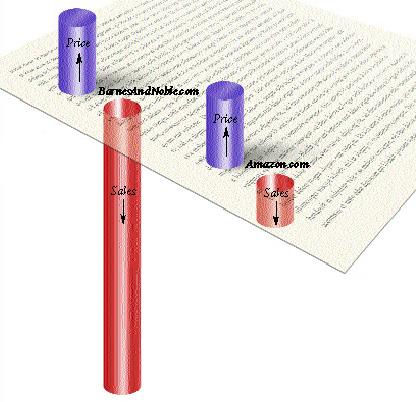 Fig.1
Fig.1
On
the same page?
While the two leading online booksellers, Amazon and Barnes
and Noble, are sensitive to pricing, B&N is much more
so than Amazon. Extrapolating sales-quantity figures from
the sales-based book rankings each outfit lists on its Web
site, GSB economist Austan Goolsbee and Yale economist Judith
Chevalier found that a 1 percent price increase at B&N
reduces sales by 4 percent. The same price increase at Amazon,
meanwhile, reduces sales by only 0.5 percent.
Goolsbee, whose research will appear
in the June Quantitative Marketing and Economics,
has no easy explanation for the large gap. Amazon’s
heavy investment in customer loyalty could not be the only
answer, he says. Economic theory suggests that even in a
monopoly a 1 percent price increase would slash sales by
1 percent—double that of Amazon. Perhaps Amazon prices
its books artificially low, Goolsbee speculates, to attract
customers who will also buy higher-priced products or who
won’t switch when Amazon later raises prices.
—A.B.



![]() Advertising
Advertising
![]() About
the Magazine
About
the Magazine ![]() Alumni
Alumni
![]() UChicago
UChicago
![]()
![]() ©2003 The University
of Chicago® Magazine
©2003 The University
of Chicago® Magazine ![]() 5801 South Ellis Ave., Chicago, IL 60637
5801 South Ellis Ave., Chicago, IL 60637![]() fax: 773/702-0495
fax: 773/702-0495 ![]() uchicago-magazine@uchicago.edu
uchicago-magazine@uchicago.edu
